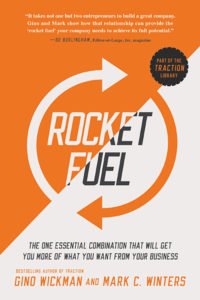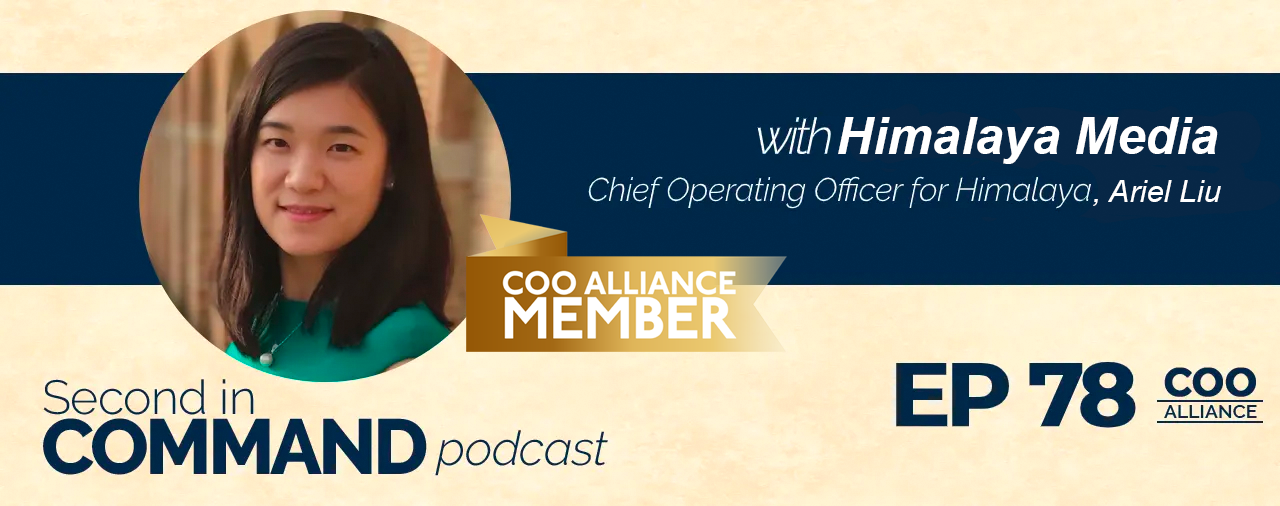Podcast: Play in new window | Download | Embed
Our guest is COO Alliance Member Ariel Liu, COO of Himalaya Media.
Himalaya Media is an innovative podcast platform with leading monetization offerings and audience growth solutions. Behind the scenes, we have Ariel Liu as the COO. In this episode, Ariel shares what Himalaya is about and what makes it unique. She talks about her beginning at Himalaya, what the day-to-day operations look like, and how she interacts with the CEO. Ariel also discusses why a lot of people are moving from audiobooks to podcasts and what that means for creators and their communities. When she’s not the being the strong Himalaya COO, Ariel spends time with her family doing activities such as jogging and listening to podcasts.
Resources:
Connect with Cameron: Website | LinkedIn
Get Cameron’s latest book: The Second in Command – Unleash the Power of Your COO
Subscribe to our YouTube channel – Second in Command Podcast on YouTube
Get Cameron’s online course – Invest In Your Leaders
—
Ariel is the COO of Himalaya Media, an innovative podcast platform with leading monetization offerings and audience growth solutions. Before joining Himalaya, she started her career at Accenture as the Product Lead of global collaboration solutions. She then joined the ONE Music Group, a Sequoia Capital portfolio focusing on music innovation to lead their global expansion to twenty-plus countries and became profitable in two years. She has a Master of Science degree from the Stanford Engineering School. Ariel, welcome to the show.
Thank you for having me here, Cam. It is an exciting opportunity for me as well in the way that I’ve been listening to the show from the beginning since I got the COO title.
Thank you. It’s interesting. We got introduced and I was talking to you about your podcast platform. Why don’t you tell us briefly about what Himalaya, the podcast platform is that you have and how unique it is?
The goal of Himalaya goes back to the mission of it, which is trying to build up the platform to share knowledge and help people to reach a happier living. Based on that, looking into the podcasting industry, the biggest struggle is still for creators, especially smaller creators, “How do you build up your own community then grow your own community and audience from there?†Since technology and mobile phone penetration, everyone can easily record and share your sound, but how do you become interactive with your audience? How do you build the community around you of curiosity, sharing and connections? That’s going to be the key to help not only the creative world but help the entire podcast industry grow further. That’s where Himalaya comes from and wants to empower every creator as well as the audience. It’s a platform that you can listen to content anywhere else but meanwhile, you could engage with the creator you love anytime you want.
I was on the main TED.com website and I go to the main TED every year. I was sharing my favorite talk from TED and it was a woman who escaped from North Korea. Her story is fascinating, but you can already see the comments happening with people that are watching it. That’s what Himalaya brings in. It’s more of that community around the podcast versus just, “Here’s another one to listen to,†correct?
Exactly. That’s the same vision we have as well. We launched a community feature. Every creator can build up their own community and within that community, you can share all kinds of information. You can also engage with the audience group. It’s become your own fan club on the platform that you can share different formats of content, even live events and videos and so on.
I stumbled into your office one day. I was in San Francisco and I was recording a podcast episode with Jordan Harbinger on The Jordan Harbinger Show. Somehow, he was doing his recording in the Himalaya offices and we got to spend some time talking about it. It was cool seeing some of the cultures as well. Walk us through how you got involved with Himalaya. How do you and the CEO interact? How did you divide and conquer the roles and responsibilities between you?
I started my career in consulting but before that, at Stanford, I already started student startup groups. Back in 2008, we were taking Stanford courses. We have a former team of three and we also create physical apps. Back at that time, my passion was always in styling apps that make something different and is going to change the world or at least create value for certain people and make their life better. When I was creating all kinds of physical apps and games, you feel like, “What’s the real value behind it? What’s going to be a sustainable impact on society if the physical app you made is popular for 3 or 6 months or even 1 year if you’re lucky?†After that, you still have to come up with a new game for people that are looking for fun.
That’s why I switched to the consulting industry. I feel like that can be somewhere that can provide sustainable business value, which I was lucky that during the five years at Accenture, I was able to help multiple clients across all kinds of industries including Facebook, Google, Chevron, Best Buy and all kinds of companies. You see how they already operate and what are the things we can help from technology on the new innovation standpoint. That’s always triggered me to think about what’s next. Now, I know what’s going on the internet side and on the app side. I also know what’s in the business world and I have seen all kinds of industries in each department within the company.
That real trigger came to me when I was pregnant with my first baby. The question I always ask myself is, “How do I keep creating value for the next generation including my own kids?†That’s when I took the ONE Music Group opportunity and helped them develop the new market globally. After that, I got busy and I had this one little child to take care of and spent my time with, that I started to listen to lots of podcasts. I played lots of podcast content. That quickly rolled my passion for that industry and then realized that there are many things I can also help in that industry. When this opportunity comes to me, my friend always jokes with me that every time you had a new baby, you took a new startup that I could jump into right away.
I want to ask you about being the mom and running as COO as well. I first want to ask you about Stanford itself. You’ve got a serious degree from Stanford. While you were at Stanford, do you think there were some key lessons that you may have pulled out of the Stanford Engineering School that you still carry with you and your COO role?
The best lesson from Stanford is you never take any lessons as just a course. One that changed my life was about Facebook education, as quoted by BJ Fogg. This is back to the time when Facebook launched its own API to empower individual developers to quickly develop and then release the apps to general consumers. We were lucky enough that BJ identified this trend and then come in to school somehow to start a course although at the time, no one has done that. The professor himself hasn’t but he was like, “I had this great idea and I see this gray region. You’re welcome to join the class. It’s not going to be a textbook in the class. It’s going to be guests over to share with you the industry experience. You can ask them whatever question you have and then it’s going to be on yourself to form a team that will deliver to us during the one semester.†Stanford is a quarter, so it’s ten weeks.
Back to what you must have been in high school, I would imagine you were one of the top students getting straight As. At Stanford, what you may be also learned was everybody was straight As and you are now surrounded by true A-players. Did you see the value of having a true A-player team? I went to a college where we were all C-players and none of us were that smart. I was surrounded by a bunch of people that were average. I don’t think until later in life when I started meeting people from Stanford, Yale and Harvard and going, “You guys operate at a different level.†Did you notice that in terms of building your companies and hiring As? Have you taken that with you at all or no?
I definitely agree with you that we should always go for A-players for the team on the company but going back to Stanford, I don’t feel like the school brand name will guarantee the talent caliber there. To me, it was never the school. It’s how the experience working with that particular person reflects on the real quality of that person.
You still had to suss them out. How about when you were working with Sequoia? It’s clearly one of the top VCs on the planet and you were doing some consulting with them. What do you think are the key lessons you pulled from Sequoia that you still work with or use now?

Podcasting For Creators: The biggest struggle for creators is how to build up and grow their own community and audience from podcasting.
I didn’t consult for Sequoia. I’m a master of the ONE Smart Piano. I have lots of respect for them because they’re always aiming for, “What’s the next big thing that’s going to change the entire world?†It’s not about the industry. It’s also about fundamental value and innovation that technology brings into society.
Being a portfolio company, did that push the company? Did it drive you further to think bigger than you would have normally?
Definitely. You look at the bigger picture of what’s going to be, the final destination of this company, the product and strategy and then what’s coming next.
You talked a little bit about new innovation technology. What do you think is happening inside of businesses that you’re seeing, especially being in the Bay Area? Are you seeing anything that’s happening with technology innovation that we should be aware of?
Innovation in the Bay Area is going on all the time. Each trend is going to last for a few months or sometimes years. We are at a transition point where mobile technology is self-developed and then the daily application is also self-developed. This is a time that people start to realize the total impact that this kind of made media and information change is reflecting on people’s daily life. That’s going to further generate additional opportunities for technology innovation. Before podcasts and YouTube, you have to rely on traditional media, which is through radio and TV.
It’s hard to find the niche group that you’re attached to and then empower the whole group to record, share the words, build a community around it and be able to involve and engage with the community on a daily basis in the team. Nowadays, all of those become easy. That’s the reason why we are seeing podcasts suddenly become popular although it has been around for several years. The same reason that we see an emerging change in the entire information consumption, switching from traditional video websites to Instagram, Snapchat and more things coming through. That’s definitely going to be a big opportunity here. The market is ready. People start to realize that and then innovation is going on.
I’ve noticed in the last several years where I used to have my laptop with me all the time. I was consuming all of my information off my laptop. It’s all off my phone now. Having a laptop is almost a pain in the ass now.
You didn’t notice at the same time, you feel lonely when there’s nothing played in the background.
I noticed one time. All of a sudden, I was flipping and I’m like, “I don’t have anything else to do. What am I going to do next?†That’s a weird feeling that I have to have a device to give me something. Each of the apps dopamine was gone. I’ve been devouring way more content from podcasts now. I moved to audiobooks and then to podcasts because I can get a lot more interesting information about what I’m interested in doing right now versus having to read the next book. It’s cool. Being a mom, you’ve got two kids and you’re also the COO of a high-growth technology company. How do you manage it all? How do you do it?
You have to lean in. I’m lucky enough that my husband is supportive, although he’s also running his own startup. The grandparents are always there to help so that definitely lifts a lot of things from our plate. I’ve learned from daily work as well. Meanwhile, as you’re taking care of kids, there are many ways that you can identify the pattern so you can spend higher quality time with them and then also make your life easier. In the house, no matter how busy we are, we still try in the morning to go for a little jogging nearby. There’s half of our time that we have dedicated between me and my husband and also our two kids. Before sleep, we always read a book or sometimes, if I’m too tired, I’m just going to play some podcasts to listen so they can enjoy the story behind that. It helps a lot as well.
How about at work? Do you notice that it has helped you at work in building a company that you timebox better and you don’t work constantly because you have to leave? Are you seeing that impact at all?
I feel like in this role, I have to be reachable almost all the time but what I have learned is how to empower people, see the strands and also patterns and different motivations behind each member within the company that I can better dedicate, better plan and schedule for everyone. You never know what’s going to happen next in a startup, but on a daily operation level, we are all in good shape.
How many employees do you have in Himalaya?
In a San Francisco office, we are about twenty people.
Do you have some that are remote as well or in other offices?

Podcasting For Creators: Always go after the bigger picture of what’s going to be the final destination of the company or the current product and strategy.
Yeah, in Boston, New York. We also have developers in Beijing, China.
You’re working with a global team. How do you compete, especially in the Bay Area, with the war on talent? You’re competing against companies that can put more money out or better perks out? How do you recruit and attract people to a startup and into a technology company when they have many other choices?
We don’t feel like we’re competing against another company. This is for people who have a true passion for audio and then knowledge or content sharing. If you’re passionate about how to empower everyone to share the voice to be able to reach out to the right audience and interact with the audience to further grow, then we are over a unique opportunity here. There’s a group of people who firmly believe in that vision and are passionate about that mission overall.
You’re recruiting based on your core purpose and the mission of the company and attracting people who love what you’re doing and why you’re doing it and then you’re bringing them in from there. What do you do on the interviewing side that’s different? Do you have any way to know or to select people that you think are doing well or always look good on paper?
When interviewing people, I usually try to give them at least 1 or 2 cases and then match on our daily operation tasks or problems that we have to address. I want to see what’s that person’s thinking pattern behind it and what’s the priority and reflect the value system behind it. I always love to ask about a person’s vision and plan for the next five years, see how he is planning for himself, what’s his vision in the entire industry and his personal mission out there. Usually, I combine with those two in their case, passion as well as the vision that you can get a good understanding of a person.
You get a good understanding of them and you also get a good understanding of how to recruit them and how to sell them on joining the company, too. Where have you been growing? Where have you been working on your skillset as a COO?
Back to the time, I still remember when I first got this title, I was like, “What does this all mean?†I know I was going to be supporting the CEO of the company and supporting the entire company but what does it look like on a daily basis? How do I know that I’m doing the best I can? I was searching around and that’s how I found you guys. I listened to the second episode and it was Erik Church. He mentioned a book, Rocket Fuel. That’s the first book I bought about standing around COO and how that works. There is some research, readings and chatting with people around and hopefully, joining your COO Alliance Summit that I can also get connected to more COOs and learn from them. The daily operation of the fast-growing startup is training me every day every minute.
You will be coming to your first COO Alliance so it’s cool that you were able to be here. Where are you and the CEO? The CEO has the vision of where they’re growing the company. How did you get on the same page as the CEO as to what they wanted to build? How do you get them on the same page with you as to how you’re going to build it and what your plan is? How do you do that?
Our CEO is definitely a great visionary. He comes from a CS background. He’s amazing at recognition algorithms but also, he sees a huge opportunity in the audio industry here. Based on how we are working together on a daily basis, I feel like the foundation is we share the same vision, same passion and we trust each other completely. Based on that, we usually have work to touch bases, and sometimes, even daily touch base points as things are moving quickly. For him to come with me, it’s simple like, “What’s his origin? What is he thinking behind it? What’s going to be the timeline we’re looking at?†If that’s a valid goal to make and then what’s going to be the KPIs or OKRs around that are assigned to each team.
For me to work with him, we’re already getting to the stage that I can share with him like the current status and what does it take to hit a goal that he has in mind. We can quickly narrow down at the execution level and what’s going to be the plan around it. It has been smoother than what I have been reading about. Part of the reason is we both come from a programming background. Sometimes we’re just two nerds talking through some data and optimizations. Sometimes, it comes in the meeting but still thinks on the big logic-wise where we’re aligned.
Do you ever have to have uncomfortable conversations where you say no to the CEO where you tell them that something’s going wrong? I was speaking with a CEO in Thailand. I coach the second in command for a large company in Thailand. He needs to go to the CEO and tell them that something’s wrong and tell him there’s some stuff about the CEO’s personality that is causing problems. He’s nervous about having that discussion and I said, “You should do it because they need the truth.†Can you walk us through that at all and what your thoughts have been around having those tough conversations?
I say no to him a lot and I never feel nervous around it. Part of the reason is because back to the beginning, it was him trying to recruit me and then joining the company, we would grow the whole thing to where we are now. That relationship that is dynamic in between. We got close so fast like friends ongoing. I’m comfortable anytime that I want to tell him like, “No, this is not the right way and that’s not realistic.†There is some feedback about improvement coming from employees of a company that can pull aside quickly like, “I want you to know that there are a few feedbacks that can also help you to be better at your job. Here are so-and-so. What do you think? What can we do afterward?â€
You said something that’s probably key to it as well, which is you pull them aside and you do it privately. You’re not giving them that feedback in front of the rest of the team, do you?
It depends. When we have hands-on meetings, if I know something, I’ll just remind him in a friendly way. Therefore, more specifically, that goes a long way and we always try to take it one-on-one.
That’s the key as well. When you have those uncomfortable discussions or the conflict discussions one-on-one, they feel safe. When you’re doing it in front of the rest of the team, they feel cornered. If you do it in that safe environment, they’re more receptive to it. In Himalaya, have you raised money as a company?

Rocket Fuel: The One Essential Combination That Will Get You More of What You Want from Your Business
Yes.
You’re operating with some investor cash so how do you answer the questions to investors or to outside capital? How do you work with them when they’re trying to push you? How do you work and communicate with them?
Given the stage we have, we have specific milestones. It is still simple in a way like after a great time, “What does the data look like? Was that a major achievement? Is that hitting our milestone? What are the major strategic discussions and conclusions from that?†We share that with investors and see how they feel at that stage at this moment. As we are moving fast and achieving results, it has been still smooth.
Have your assumptions on the industry changed at all? We always pivot a little bit along the way or bob and weave a little bit along the way. Have you noticed anything at all in the industry of the podcasting space? Has it made the company drastically change direction or are you still much on course?
I feel like the industry has been booming. You start to notice all the PR releases around fundraisings and acquisitions and all kinds of inspirations from the international market. As a result, you can see lots of bigger players. Even Google is getting into the market. You can also see lots of huge celebrities and influencers tapping into the market which is a good thing. For Himalaya, we have a bigger creator-base that we can work with. When we started, it was about polishing the product, making the best product for the creators and the world and also for the audience. We have this product ready and it’s already getting highly rated and can name it as one of the best podcast apps in the market. How do we further grow from here? That focuses on how we can reach more creators and help them more directly grow their own shows. They got a way to sustainability support their own community as well as their daily work. That has been shifted and become the major focus of the company.
How does Himalaya make its money?
We are passing out quite a few different things. The traditional podcast monetization model is through ads. You have this network of shows, you help them to sell ads and you get a revenue share from that. What we are trying to do is to see how we can further empower every creator to monetize and thus the platform can benefit from that. The industry still has to be big shows like average downloads above 20,000 or so to be able to get some ads opportunity and make some serious money. We feel like it’s going to be hard to apply to every single podcaster or whoever I want to create a voice there. Our solution is to try to explore what’s the additional monetization models for the creators as directly focusing their own content and focusing on their own audience. By helping them grow in those domains, the platform can hopefully also monetize from that.
What do you focus on day-to-day in your role as the COO?
There are many things. I’m definitely the integrator of the company. In a way, I need to focus on having the CEO’s vision get to be executed at an operational level and keep each team informed and also cooperate on the fast-changing environment. It’s changing not on a day-to-day basis, but when I look back, it’s about, “How do I handle everything?†I quickly switch to, “How do I identify the best of the best talent in each domain for each role?†Now, I have other talents and we are growing so fast then, “How do I empower every team in the company to also be able to move and deliver results as fast as they can and also making a great culture within the company?â€
When a company grows quickly, there’s often the feeling like, “I need to hire someone.†How do you avoid that feeling of needing to always hire people because you’re growing quickly?
I still feel that we need to hire people and we’re still hiring. I think it’s all about identifying the A-player that fits the best for the role and also to prove the idea and the market fit before you further grow a specific team around it.
If we were to go back to the 22-year old-Ariel, you’re graduating from Stanford engineering and you’re getting ready to start on your business career, what’s a word of advice that you would give yourself on how to succeed in business that now you know to be true, but you wish you’d known earlier?
I would love to call the young Ariel saying, “Do it in a way that you don’t have to worry about too many things. You don’t have to be too conservative when you are facing all kinds of uncertainties.†I want to tell the young lady that, “You are empowered to do whatever you feel most passionate about and everything else will come along.â€
Ariel Liu, the COO for Himalaya, thank you much for being on the show. I appreciate this.
Thanks for having me, Cam. This is an amazing experience for me as well.
You’re welcome.
Important Links:
- Himalaya Media
- TED.com
- Jordan Harbinger – Jordan’s interview with Cameron Herold
- ONE Smart Piano
- Erik Church – Past episode
- Rocket Fuel
About Ariel Liu
 Himalaya Media is an innovative podcast platform with leading monetization offerings and audience growth solutions. Before joining Himalaya, she started her career at Accenture as the product lead of global collaboration solutions. She then joined The ONE Music Group (a Sequoia capital portfolio focusing on music innovation) to lead their global expansion to 20+ countries and became profitable in 2 years.Â
Himalaya Media is an innovative podcast platform with leading monetization offerings and audience growth solutions. Before joining Himalaya, she started her career at Accenture as the product lead of global collaboration solutions. She then joined The ONE Music Group (a Sequoia capital portfolio focusing on music innovation) to lead their global expansion to 20+ countries and became profitable in 2 years.Â
Ariel has a Master of Science degree from Stanford Engineering School.





